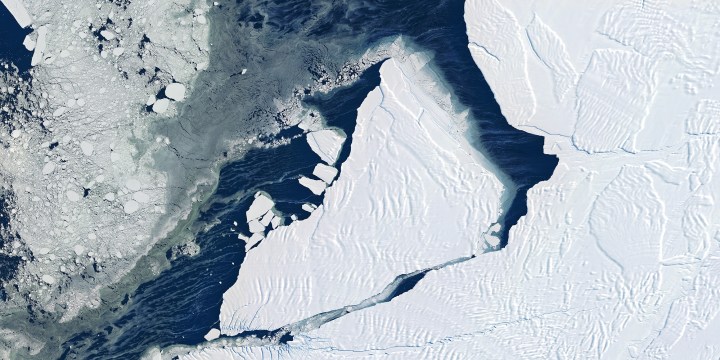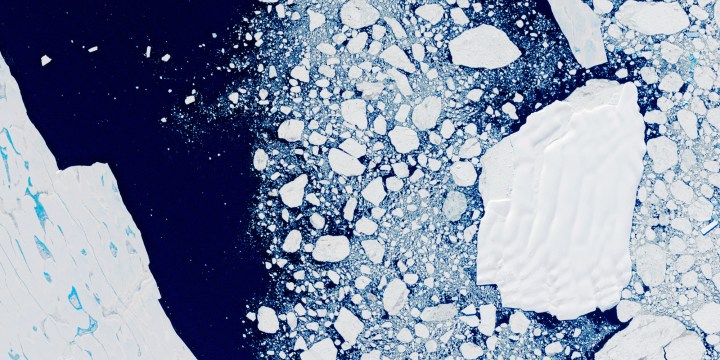OUR BURNING PLANET EXCLUSIVE
Ukraine’s Antarctic ocean rescue plan (but Russia may hold the aces)

In a diplomatic note seen by Our Burning Planet, Ukraine’s polar authorities have described their vision as the pending chair of Antarctica’s key fisheries and conservation body. But will Russia — which has searched the Southern Ocean for oil and gas, and damaged Ukraine’s Antarctic head office in a missile attack — roll out the chairship red carpet at a major marine meet?
Gathered on the edge of the human world in the Tasmanian capital of Hobart, 27 Antarctic fishing nations are under pressure this week to approve bold rescue plans for an ocean staring down ecological collapse.
Those globally critical waters, known as the Southern Ocean swirling around Antarctica, are threatened by a range of human stressors — including the climate emergency, vanishing ice and the possible extinction of iconic species, such as the endangered emperor penguin. This vast, icy ocean wilderness also embraces the Antarctic Circumpolar Current, which regulates the Mothership’s climate.

Mount Michael surrounded by floating sea ice, imaged by satellite through Shortwave Infrared (SWIR) wavelengths. (Photo: Gallo Images / USGS/ Nasa Landsat / Orbital Horizon)
And how the so-called fish stocks of this geopolitical theatre are managed is now under the periscope at the 41st meeting of the Commission for the Conservation of Antarctic Marine Living Resources (CCAMLR). That is, the fisheries arm of the Antarctic Treaty System (ATS), which devotes the bottom of the Earth to peace and science.
In a diplomatic note seen by Our Burning Planet, Ukraine’s Antarctic authorities have listed some of their key priorities for this week’s discussions about its pending chairship of the intergovernmental organisation, founded in 1982 to regulate krill, toothfish and other marine stocks. Marine parks, blocked by China and Russia for the past five years at previous meetings, are among those stated priorities.
And as is its standard alphabetical right as a decision-making member, Ukraine will assume the rotating chair from Sweden in 2023 and 2024.
But Sweden has weathered a tense reign marred by Russia’s war against Ukraine, marine park tensions and a new spat between the US and the UK after Russia vetoed catch limits for sought-after Chilean sea bass (Patagonian toothfish).
And there are questions about whether Russia will play along under the commission’s consensus-based decision-making system. For Ukraine to assume that chair, no member state must oppose it. Yet, this year’s meeting did not exactly get off to a flying start when multiple members walked out on the Russian delegation’s speech, in support of Ukraine.
Pitching and rolling
There has hardly been a more daunting time for a state to assume these contested reins — let alone one embroiled in a brutal war unleashed by a fellow commission member.
Even so, the diplomatic note, which is still in draft form, shows Ukraine is not only convinced of its ability to lead this commission of world powers, which includes South Africa and Namibia as the only African member states.

The Larsen B Ice Shelf, Antarctica. Global warming and climate change eventually led to the collapse of the Larsen B Ice Shelf in Antarctica during 2002. This satellite image shows a closer view of the breakup. (Photo: Gallo Images)
It is also keen to stress it has the decades-long diplomatic, scientific and field capability to do just that.
Established in 1947, but donated by the UK to Ukraine in 1996, the Eastern European state’s West Antarctic research station, Vernadsky, maintains the heat-threatened region’s longest-running climate and ozone data.
It also has an ice-class research vessel, the Noosfera, which has been at anchor in Cape Town since May, after finishing her maiden voyage for Ukraine during the 2021/22 Southern Ocean research season. And Ukraine’s five Southern Ocean fishing vessels were registered to target both krill and toothfish over the past year.
According to the note, “The history of Ukrainian exploration in the Southern Ocean began many years before the establishment of CCAMLR. A group of biologists and oceanographers onboard the Ukrainian fishing vessel Aelita, from Kerch, began exploration in the Antarctic Indo-Oceanic sector in 1967.”
The note also points out that Ukraine is “actively involved in CCAMLR’s research activities given its undoubted commitment to conservation” and “its interest in the rational use of Antarctic marine living resources”.
“Ukrainian scientists ensure the implementation of CCAMLR research programmes and take an active part in the implementation of tasks within the international system of scientific observation on vessels of other member states,” the note continues.
Ukraine’s research programme has focused on penguins and ocean-based research next to the Vernadsky research station “to create a network of marine protected areas”.
The note says the member state “has always considered the implementation of all necessary and possible measures for the conservation of Antarctic marine living resources, based on the best available scientific data, to be a top priority.
“Ukraine also seeks to support fisheries in Antarctic waters on the basis of a precautionary approach, as an important source of valuable biological materials, unique in their properties.”
Visit Daily Maverick’s home page for more news, analysis and investigations
Looking for fossil fuels, firing missiles
This is a diplomatic statement that aims to strike a constructive tone.
Alluding to incursions into sovereign Ukraine soil, it does not mention Russia by name. After all, ATS diplomacy prides itself on the singular achievement of having avoided bloodshed on the White Continent since the region’s governing framework entered into force 60 years ago.
And the commission held its first meeting at the height of the 1982 Falklands/Malvinas war between founding members Argentina and the UK, fought just north of the treaty area. At an ATS annual meeting in May and June, Russia approved a Western-led penguin rescue plan blocked by China.
“We believe that together all CCAMLR nations have a capacity to act fairly and fruitfully, respecting human rights, and the rights of sovereign nations to their own path and development,” the note says. Calling for universal support of ongoing marine park conservation, and climate investigations, it describes “political ambitions serving for a better world for the whole of humanity”.
Russia has not been a consistent champion of textbook ATS compliance.
To scour the Southern Ocean for oil and gas deposits, Russian vessels have sailed via Cape Town almost every year since the 1998 Antarctic mining ban entered into force, a recent series of Daily Maverick investigations has shown.
Russia denied transgressing the ban, saying it was concerned with scientific research. South African authorities have repeatedly declined to comment on the matter. (Approached for comment on the commission’s current Hobart meeting, spokesperson Albi Modise of South Africa’s fisheries department told us that “staff members do not talk to the media directly”. The communications office, the division that says it is mandated to do so, has not responded to our questions.)
Since December 2020, there is no record of a registered Russian fishing vessel on the commission’s database since New Zealand accused Russia’s Palmer — a toothfish harvester — of plying off-limits waters.
And in October, Daily Maverick reported that a Russian missile struck ‘15m’ from Kyiv’s Antarctic headquarters during the large-scale strikes across Ukraine. It was unclear if the missile was aimed at the headquarters, but the force of the nearby impact heavily damaged the offices, almost destroying the critical climate server, Ukraine authorities told us.
Dr Alan D Hemmings, an Antarctic governance professor at the University of Canterbury in New Zealand, says he is “not aware of any case of the rotating two-year chairing ever having been stymied by objection from other states. That is not to say it is impossible.”
It would be “an own-goal for Russia to seek to do this — but they don’t appear to be very good at strategic planning, so that does not rule it out”.
Hemmings suggests member states may have the option to ignore a possible Russian veto — unless such a veto was supported by those members which have abstained during UN resolution votes on the war: thus China, India and South Africa. But the governance specialist emphasises there is no evidence that this is likely. Indeed, these states may want to avoid escalation.
“If Ukraine was blocked by Russia, I think the case for suspending or expelling Russia from CCAMLR might be bolstered,” he says. At the very least, a Russian veto risks “further isolation”.
“The argument for not penalising Russia is essentially a variation on, ‘Let’s not bring external geopolitical confrontation into the Antarctic if we can avoid it,’” he says. “If Russia blocked Ukraine, then plainly Russia has already brought external geopolitics into the ATS and thus the argument against biting back is lessened.”
Russian polar authorities did not respond to immediate requests for comment.
‘We can do extraordinary things in the Antarctic’
In an email, senior Antarctic official Andrii Fedchuk described the challenges of managing Ukraine’s polar interests during the country’s “new” normal.
“I hasten to reply while there is light — as power outages and rolling blackouts are now our new reality,” wrote the head of international scientific and technical cooperation for Ukraine’s National Antarctic Scientific Centre. “We hope the members will find a way to overcome objections from Russia.”
Coinciding with the start of the Hobart meeting last week, an international group of 10 scientists called on the commission to reconsider the conservation management of the Southern Ocean.
The hard-hitting call to action in the journal Science includes the South African polar scientist Professor Steven Chown. Now at Australia’s Monash University, Chown recently wrapped up his term as president of the influential Scientific Committee on Antarctic Research.
Melting ice floes in “prime krill fishing grounds have further enabled vessel access” and “allowed for fishing year-round, leading to increased competition with predators and removal of krill from the food web”, the analysis says. The end product is canned, processed into fishmeal for farmed fish, or sold as health supplements.
Responding to questions by email, CCAMLR executive secretary Dr David Agnew says the commission has introduced “a precautionary annual catch limit of 620,000 tonnes”.
This would be just “1% of the biomass of 60 million tonnes. Over the last three years, the catch has been about 400,000 tonnes annually.”
The University of Colorado Boulder’s Professor Cassandra M Brooks, the Science paper’s lead author, told us she wanted to be optimistic about the commission’s mandate, and its ability to execute it.
The commission “is concerned with the conservation of Antarctic marine living resources”, she says.
“We can do extraordinary things in the Antarctic. At the height of the Cold War in 1959, countries came together and signed the Antarctic Treaty — suspending sovereignty, banning nuclear and military operations and dedicating the continent to peace and science,” Brooks says.
“In 2016, despite political tensions between some countries, we came together and adopted the Ross Sea region marine protected area. This year, we can certainly continue this legacy.” DM/OBP




















 Become an Insider
Become an Insider
Comments - Please login in order to comment.